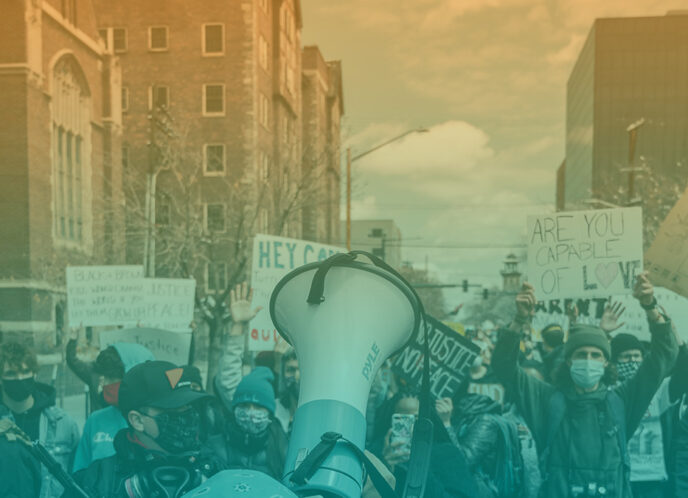Putting a stop to private prison contracts does little to address dire conditions for inmates, especially during a pandemic.
MediaJustice Fellow James Kilgore’s op-ed in Al Jazeera
In his first executive order on criminal justice, United States President Joe Biden addressed the thorny issue of private prisons.
Framing his January 25 order as part of a commitment to “racial equity”, the president wants to halt the renewal of widely reviled private prison contracts by the federal government. Biden proclaimed this as a “first step to stop corporations from profiting off incarceration.”
Reform groups like the American Civil Liberties Union (ACLU) praised Biden for pulling the plug on private prison contracts but argued that it fell short of his campaign promise. Ultimately, what is missing from the order may be as telling as what it contains.
The scope of Biden’s move for prisons is small. Private prisons hold only about 16 percent of the population in federal Bureau of Prisons (BOP) facilities and the BOP slice of the carceral pie is less than 10 percent of all those behind bars in the US. Even for this small sector of the prison population, the executive order does not address the issues of poor conditions and excessive violence that have repeatedly surfaced in research and court cases involving private prisons.
Most importantly, during a pandemic, halting the renewal of private prison contracts, some of which continue for up to nine more years, does nothing to reduce the spread of COVID-19 among jailed populations.
As of January 19, the Marshall Project reported 355,957 COVID-19 cases among people in prison, with a death count of 2,232. This is twice the death rate of the wider population.
Stopping the spread inside means releasing people. According to Johns Hopkins Bloomberg School of Public Health, prisons have an infection rate four times higher than the general population.
Jacob Kang-Brown, a senior research associate at the Vera Institute – the justice, policy and research centre which released a national census of prisons and jails this week, noted: “The efforts to reduce incarceration so far … have been inadequate, even though they have resulted in almost 300,000 fewer people behind bars.”
Biden’s policy skirts around other crucial issues as well, some of which his campaign platform on criminal justice highlighted.
For example, Biden’s platform argued that the “federal government should not use private facilities for … detention of undocumented immigrants”. As in the private prison sector, the major players in immigration detention are the GEO Group and CoreCivic. For every 100 immigrants in detention, 32 are under GEO Group facilities, with 21 under CoreCivic.
Immigration detention has harboured one of the greatest travesties of the Trump presidency – the separation of immigrant children from their families. Although Biden promised to deal with this “moral failing” on day one, so far no plan has been put in place to correct it.
At the same time, restructuring by Immigration and Customs Enforcement (ICE) in recent years has landed many immigrants in county jails, outside the reach of Biden’s order on private prisons. Also not mentioned in the order is the massive Intensive Supervision Appearance Program (ISAP) run by GEO Group subsidiary BI. Under ISAP, BI supervises more than 85,000 immigrants with about 40,000 on BI’s monitoring devices. The latest ISAP contract awarded BI a potential revenue stream of $2.2bn.
The executive order does not fundamentally address the conditions for the 14,000 people currently held in the private prisons under BOP – they will merely get a new jailer. As abolitionist activist and author Ruth Wilson Gilmore reminds us: “If all the contracts ended tomorrow, nobody would walk free.”
While studies show that conditions in private prisons are worse than government-run facilities, some of the nation’s most notorious lockups – Angola in Louisiana, the underground maximum-security federal prison in Florence, Colorado and Pelican Bay in California – are state-run.
Last, the move fails to address another key plank of the election platform: “All other methods of profiteering off of incarceration.”
A 2020 report from Worth Rises identified more than 4,100 corporations that profit from imprisonment in the US. The GEO Group and CoreCivic control a small but important sliver of the carceral profits pie. The reach of these two firms, along with that of other important operators, such as telecom providers Securus and GTL, is extending into diversion programmes, re-entry, and electronic monitoring while maintaining a grip on traditional carceral revenue streams from prison phones, contracts for food service and healthcare provision. These firms are virtual carceral conglomerates, contracted by state, local and federal government actors to perpetuate a state-driven prison industrial complex that soaks up at least $180bn of taxpayer money each year.
Wilson Gilmore urges a look at the bigger picture of this executive order. “People ought to pay more attention to cause and effect,” she urges. “The USA’s prisons haven’t been bulging because a few private parasites grabbed contracts … Rather, the privates exploited an opportunity that came about because the 52-plus prison jurisdictions have the legal, executive and administrative power to lock people up.”
In the end, private prison contracts amount to a soft target – one that, as think-tank The Prison Policy Initiative spokesperson Wanda Bertram points out, constitute “the least popular parts of our exceptionally unfair criminal justice system”. “If his executive order is to be anything more than a symbolic victory,” she says, “Biden needs to do more than just end private prison contracts.”
Biden has a deep history of culpability for supporting mass imprisonment with his 1990s push for prison building and harsh anti-Black sentencing laws, during his years as a senator.
For those of us who have been imprisoned and, more crucially, those still locked up, symbolic victories mean very little. We want executive actions that undermine the core of history’s most gigantic punishment system and a reallocation of that $180bn towards repairing the damage done by the US’s failed carceral experiment.



